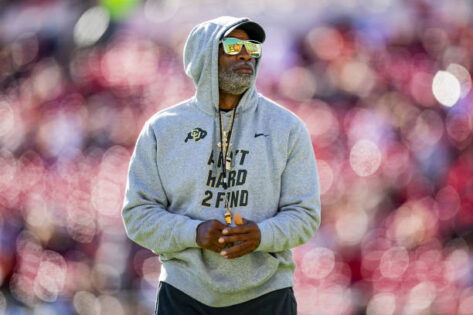Well, the Spring games just saw a gust of change. All thanks to Deion Sanders, who “would like to style it like the pros.” Sanders wants more than an intrasquad scrimmage; he craves a real opponent. Bold? Absolutely. But he’s not alone. Mike Gundy wants a spring Bedlam game against Brent Venables’ Sooners, and coaches like Matt Rhule and Ryan Day are on board. The NCAA swiftly rejected the idea, but one analyst made it clear that they can’t control public perception. Sanders ignited a debate, and now, everyone’s following suit.
In the end, Deion Sanders’s off-season efforts to bring a definite change came to nothing. Both Sanders and Fran Brown were set to do something CFB has never seen before. As they proposed a spring game between the two of them to the NCAA. Outcome? The NCAA didn’t allow them to compete against each other. But why? Other teams are too far into spring practice to bring something of this sort, with concerns over injury, academics, and, lastly, Matt Rhule’s favorite word: “tampering concerns.”
But unlike NCAA officials, analyst Adam Breneman comes in full support of Deion Sanders idea of playing other teams in spring practice. As he says, “So Deion Sanders wants spring games to be real games, and he’s not alone. I agree with him. I’ve talked to coaches who love this idea. Fran Brown even tweeted about it, but why hasn’t it happened yet? Let’s get into it.” Fran Brown did make an effort to make this change happen despite the distance, tweeting, “We will come to Boulder for 3 days.” But the major problem is not the NCAA but the coaches who are not willing to volunteer.
As Breneman highlights, “The NCAA still bans teams from scrimmaging each other in the spring, but their enforcement power is weaker than it’s ever been. The real hold-up is that coaches are not aligned on the topic. Some worry about injuries. They’re giving away too much film. Others don’t want opposing staff scouting their roster for the portal.” Look, in today’s NIL and transfer portal era, having a spring practice will not make any difference if players are willing to leave.
Just take Bryce Underwood‘s example; he chose the $10.5 million price over his early commitment to LSU, right? But all other coaches fear about is their team getting poached or injured. That can happen even in the summer camp and in the coming spring portal too. That’s exactly what Deion Sanders wanted to say: “I don’t believe in that. I don’t really want to condone that. I would like to play in the spring. Actually, I (would) like to play against another team in the spring. That’s what I’m trying to do right now.”
Let’s be real; there’s a huge advantage to playing against other teams. As Breneman explains, “The upside is that you get real competition in the spring to see how your guys do against a playbook they don’t know. Instead of going against your offense, against your defense, go against someone else’s team and coaches who are trying to scheme you up.” Playing against your team members can never give you real game-day experience. For that, you need to test your caliber. Meanwhile, Adam Breneman is sure that “If enough coaches say yes to this. The NCAA can’t stop them.” Now, even though Deion Sanders’ spring game idea is getting a push, there’s a major concern waiting in the sidelines for him.
Deion Sanders’ Colorado Buffaloes’ future in jeopardy?
The era after Shedeur Sanders and Travis Hunter feels like abruptly switching from a bullet train to walking—the pace is drastically different. Colorado lost more than two star players; they lost the very core of their program. Reporter Tom Fornelli pointed out, “Now this will be the first time where he won’t have his sons, but more importantly, you also don’t have Travis Hunter… you were trying to supplement them, but now that those two were gone will the way that they have worked in the portal have the same kind of impact.” That’s the million-dollar question echoing throughout Big 12 discussions.
Coach Prime built a program with star power; players weren’t just drawn to the culture—they came to play with Shedeur and Hunter. Now, there’s talent like Will Shepperd, Jimmy Horn Jr., and Omarion Miller, but their new QB, Kaidon Salter, needs to build chemistry with them because replicating Hunter and Shedeur’s impact won’t be easy.
Let’s be honest: The Big 12 isn’t a league where you can bluff your way to success. As Fornelli noted, “It is a coin flip league… every single matchup and it’s a three-point spread either side.” There’s no margin for error. A bad quarter, a key injury, or a recruiting misstep can mean the difference between a 10-4 season and an 8-5 or even a disastrous 5-7 record.
Just ask Utah how quickly things can unravel. One moment, you’re a preseason favorite; the next, you’re scrambling for bowl eligibility. All eyes are now on Deion Sanders, not just as a father-coach or recruiter of star players, but as a program builder. Can he succeed at Colorado without the lure of his star power? Can he win those close games with a new team identity? Because the Big 12’s unpredictable nature doesn’t wait for anyone.
The post National Analyst Drops Straight Verdict on NCAA’s Control After Deion Sanders Fires Up Spring Game Talks appeared first on EssentiallySports.
